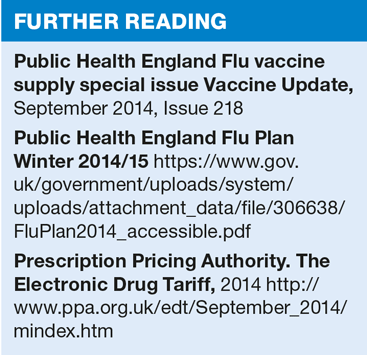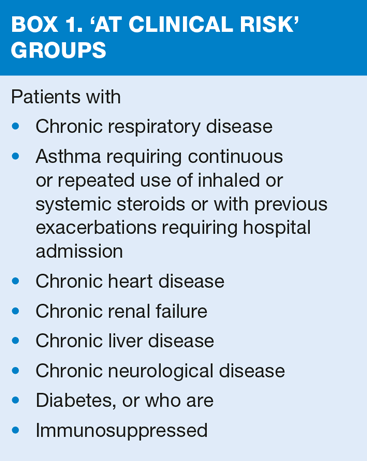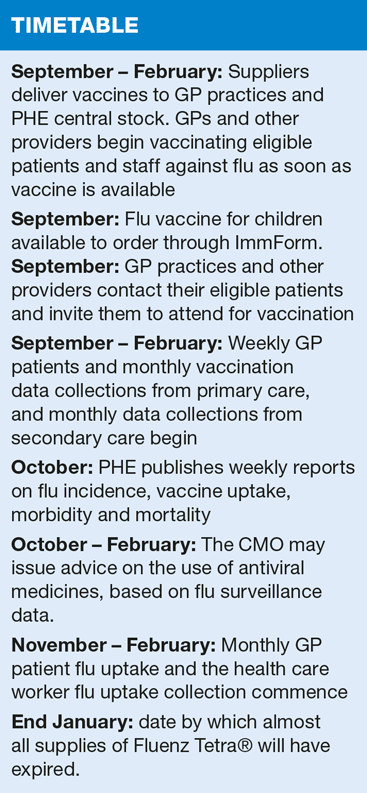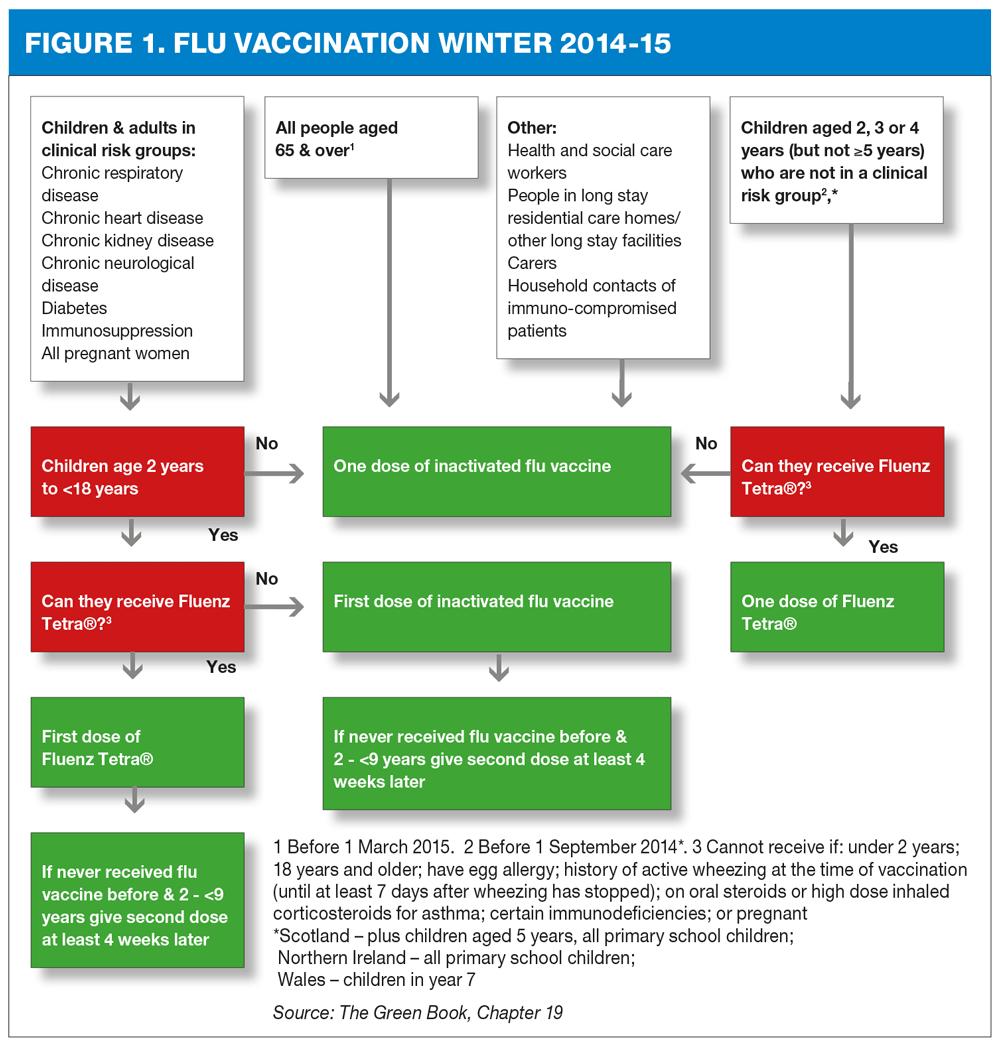Last minute reminders for flu campaign
Mandy Galloway
Mandy Galloway
Editor, Practice Nurse and medical writer
With the start of the seasonal flu vaccination campaign upon us, here are some timely reminders for the task ahead
Last year's flu season was mild compared to other years, which may result in greater public complacency — but this is one thing that practice nurses cannot afford to be, as we never know when the next high incidence flu season may occur until it happens.
And despite the efforts of everyone in general practice for the 2013-14 campaign, there is still a great deal to do to meet the stringent targets for this winter's vaccination campaign.
UPTAKE
The key objective this year is to increase the uptake of vaccination among clinical risk groups, pregnant women and health care workers. This means actively offering the flu vaccine to 100% of all those eligible, and vaccinating at least 75% of those aged 65 years and older.
For a number of years now the vaccine uptake rates for those aged 65 and over have been close to the European Union target of 75%. This represents a tremendous achievement especially given that the numbers in this group are growing due to an ageing population. Therefore, GP practices and other providers have vaccinated larger absolute numbers even though the rate has remained similar.
Despite continued efforts, for a number of years around only half of patients in clinical risk groups have been vaccinated. Increasing uptake is important because of the increased risk that people in clinical risk groups are at from the effects of flu. For at-risk patients, including pregnant women, increasing vaccine uptake is challenging.
This year, therefore, GP practices are being asked to prioritise the improvement of vaccine uptake in those with chronic liver disease and neurological disease, including those with learning disabilities, who are at the highest risk of mortality from flu but have the lowest rate of vaccine uptake.
Chronic disease
Anyone with a chronic underlying condition is at risk of developing more severe disease if they contract any infection, including flu, often because their immune response is compromised. Flu infection increases the risk of complications such as pneumonia. The two priority target groups this year are patients with chronic liver disease and patients with neurological disease. Practice nurses should therefore search patient records for those with a diagnosis of cirrhosis, chronic hepatitis or biliary atresia, and for patients who have had a stroke or history of transient ischaemic attacks (TIA) and ensure that they are invited to have the flu vaccination.It is also recommended that clinicians should consider the risk of flu infection exacerbating any underlying disease that a patient may have, as well as the risk of serious illness from flu itself, for individuals with multiple sclerosis and other hereditary and degenerative diseases of the central nervous system.
Children
Vaccine uptake is particularly low in children under 16 years of age with clinical conditions that put them at most risk of complications or hospitalisation from flu. The new programme to provide flu vaccine to all children aged two to under 17 years will take time to implement. In the meantime, it is important that children and parents of children in clinical risk groups understand the importance of children being vaccinated against flu and the protection it offers them, particularly children with neurological disease, including learning disabilities. Practice nurses should make sure that all children in clinical risk groups have the opportunity to receive flu vaccine.
Pregnant women
Pregnant women are at increased risk of complications if they contract flu, and there is evidence that having flu during pregnancy can result in premature birth and smaller infant size and weight at birth. Flu vaccination can help to reduce these risks. Not only that, but flu vaccination during pregnancy provides passive immunity against flu for infants in the first few months of life.
Flu vaccination with the inactivated flu vaccine can be given at any stage of pregnancy and no study has shown any evidence of adverse effects on the baby. Practice nurses need to be vigilant throughout the flu season in order to identify women who are not pregnant at the start of the immunisation programme, but who become pregnant during the winter.
Healthcare professionals
Frontline health and social care workers have a duty of care to protect their patients and service users from infection. This includes getting vaccinated against flu. Healthcare workers are a very influential group. Patients trust their nurses, doctors and other healthcare professionals and their opinions can affect the way patients act.
A vaccinated healthcare worker can talk from first hand experience with patients and reassure them of the benefits of being vaccinated. Healthcare workers need to understand the benefits of the vaccine and dispel the myths that may have developed about the vaccine.
Carers
People who are the main carer of an older or disabled person whose welfare may be at risk if the carer falls ill, including carers who are children, should be offered the flu vaccination. One strategy to increase uptake in this group is to remind at risk patients that if they have someone who cares for them, their carer is eligible for vaccination.
SUPPLY
Flu campaigns in recent years have been blighted by shortages of vaccine or delays in supply — in 2006, supplies were held up until December, and last year many practices had to delay the start of their flu clinics because they couldn't obtain the seasonal vaccine.
GSK is reported to have warned health authorities in Canada that it will not be able to fulfil approximately 30% of the Canadian order, has confirmed that it would start delivery in the UK, as agreed with each practice, from 15 September. A spokesperson said: 'We currently have no issue with our supply and are not expecting any at this point.'
As Practice Nurse went to press, Public Health England announced restrictions on the number of doses of the live inactivated vaccine for children, Fluenz Tetra®, that practices will be able to order. Practices will be limited to 50 doses (5 packs) per week from the start of ordering of centrally procured supplies, from Wednesday 24 September. Practices will be able to place new orders every week, but for no more than they will need for the next week or two. This is because this vaccine has a short shelf life, and over-ordering could result in doses passing their expiry date before they can be administered. It is also worth noting that almost all doses will have expired by the end of January 2015.



